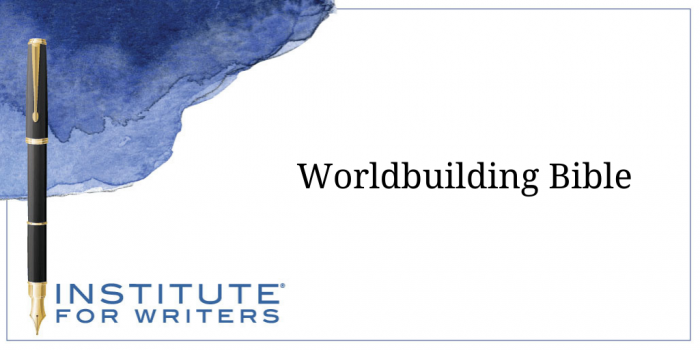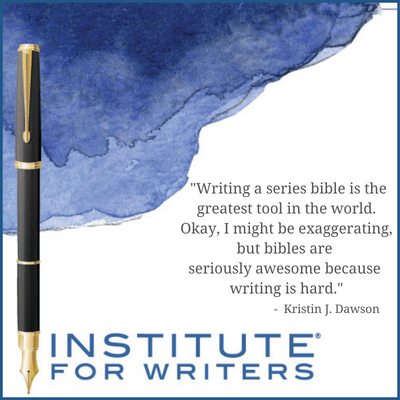1000 N. West Street #1200, Wilmington, DE 19801
© 2024 Direct Learning Systems, Inc. All rights reserved.

As a novelist, why do you need a worldbuilding bible? And what are they? In our previous article, we touched on this topic. But in this, the final article in the worldbuilding series, we will delve into bibles for writers.
I’m focusing on this topic for two reasons. First, due to discussions within my writer community. Secondly, I made the huge mistake of not creating a bible for my first fantasy series. I thought I was keeping my world fairly simple. I thought I could keep it all in my head. I was wrong. Don’t be like Kristin. Create a worldbuilding bible to collect all your lovely and amazing world notes in one easy to reference location!
Writing a series bible is the greatest tool in the world. Okay, I might be exaggerating, but bibles are seriously awesome because writing is hard. Don’t fall into the trap of thinking, “Oh, I don’t have time to be bothered.”
 After working on the same story world for two years and 400,000 words, I realized that creating a worldbuilding bible from the beginning would have saved me hours of frustration.
After working on the same story world for two years and 400,000 words, I realized that creating a worldbuilding bible from the beginning would have saved me hours of frustration.
Furthermore, you may return to this story world at a later date; a story bible will save your sanity. Otherwise you will have to re-read everything and re-build your notes from scratch.
But don’t just take my advice. Sarina Dorie has published over 150 short stories with top speculative fiction magazines. And she’s also published several series. Sarina is a prolific world-creator, and here is what she has to say:
“After I become neck-deep in story, there are details I need to keep track of. My friend and award-winning author, Nina Kiriki Hoffman, long ago made me create a story bible for my science fiction steampunk world in The Memory Thief Series. I discovered inconsistencies in the manuscript that I wouldn’t have found otherwise. I cannot recommend story bibles enough!
My current urban fantasy series, Womby’s School for Wayward Witches, is an eighteen-book series, plus there are multiple spin-off series in the same world. Story bibles are a must because I need to keep track of the history, timeline, geography, magical rules, Fae laws, social etiquette, terminology, and all the worldbuilding details.
But for me, this is what I do after I create my discovery draft. For others, they might make it before they write the novel.”
A story bible is essentially a place to keep all your worldbuilding. But a bible can include far more than just worldbuilding.
These bullet points are not an exhaustive “must have” list. Essentially, a story bible can include whatever you think you’ll need to reference in the future. I have notes scattered all over Scrivner. There’s definitely some benefit from noting things in different scenes, but also put important reference items in the story bible.
There’s no right or wrong time to create a book bible. As Sarina Dorie pointed out above, she creates her bible after her first draft. Many people create their bible while they are editing. If you make changes, for example, to a magic rule, then jot it down in the bible! It’s okay to adjust your story as you go along, and it’s fine to change the bible, too. But because of your notations, future revisions will be much more consistent.
 Some people, like me on this particular series, will create a worldbuilding bible toward the end of the series. Why create one at this point? In case I come back to this world and do a spin-off series, it will be far easier for me to create a bible now than it will be two years from now.
Some people, like me on this particular series, will create a worldbuilding bible toward the end of the series. Why create one at this point? In case I come back to this world and do a spin-off series, it will be far easier for me to create a bible now than it will be two years from now.
There are different ways to compile a worldbuilding bible. Many writers who type manuscripts on a computer actually use a physical binder with their notes. That way they can have the bible to the side, along with other reference material. Authors can flip through the pages while keeping their novel up on the screen.
Some people use white boards and sticky notes for the plotting process. They have a system for moving the sticky notes to a book or binder for the future. Other people have a document on their computer that they toggle back and forth between. You could use your Google drive, a word doc, or even a page in Scrivner. I personally have done the latter, but I do not recommend this if you have multiple books in a series. If in a second book you change your bible, you’ll have to change the bible notes in every Scrivner file-novel. I recommend having all the notes where you can easily reference them for all the books in the series.
There are great resources on worldbuilding, including a full season of podcasts from “Writing Excuses”, and how-to books from Orson Scott Card. Entire university courses teach this subject for novels, film, and virtual reality. Let your imagination run wild, and I hope these tools, tricks, and techniques will help you elevate your worldbuilding craft!
Let our one-on-one mentors help you build the worlds of YOUR stories. Take the assessment here!
Article #1: Worldbuilding Checklist
Article #2: Digging Deeper into your Worldbuilding
Article #3: 9 Worldbuilding Mistakes to Avoid
Article #4: Worldbuilding Bible (this article)
Kristin J. Dawson is a non-recovering chocolate and romantic English movie addict who loves to read science fiction and fantasy. You can find her most often indulging her favorite things at 2 am — night owls unite! Kristin writes high fantasy with political intrigue, a bit of romance, and of course, magic. She’s was a 2019 UTOPiAcon Debut Book Award Nominee and Swooney Award Nominee. When she’s not writing, taking her kids on mountain adventures, or cleaning out the chicken coop, she’s probably trying to talk her author friends into more shenanigans.
Chat with Kristin on Instagram (@KristinImagines), on Facebook (@KristinJLiterary), or her website at kristinjdawson.com.
1000 N. West Street #1200, Wilmington, DE 19801
© 2024 Direct Learning Systems, Inc. All rights reserved.
1000 N. West Street #1200, Wilmington, DE 19801
© 2024 Direct Learning Systems, Inc. All rights reserved.
1000 N. West Street #1200, Wilmington, DE 19801
© 2024 Direct Learning Systems, Inc. All rights reserved.

1000 N. West Street #1200, Wilmington, DE 19801
© 2025 Direct Learning Systems, Inc. All rights reserved.

1000 N. West Street #1200, Wilmington, DE 19801
©2025 Direct Learning Systems, Inc. All rights reserved. Privacy Policy.
5 Comments